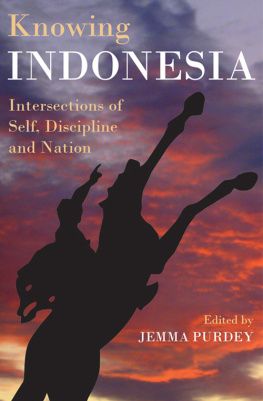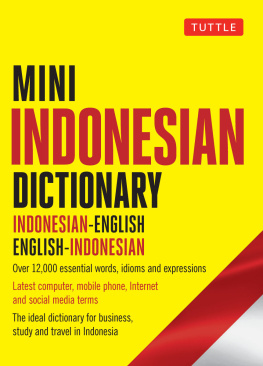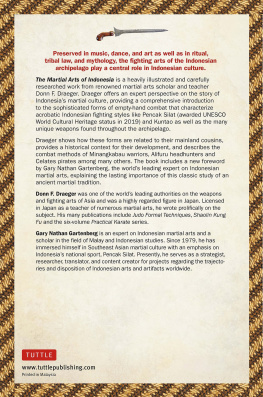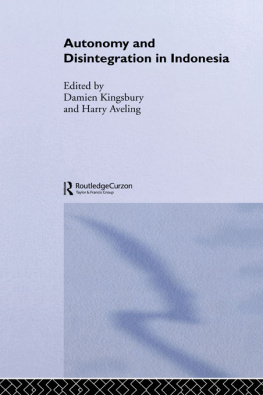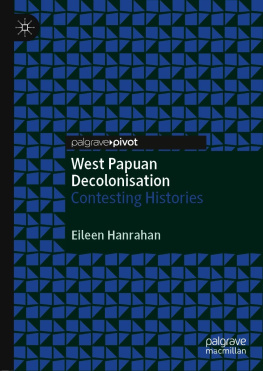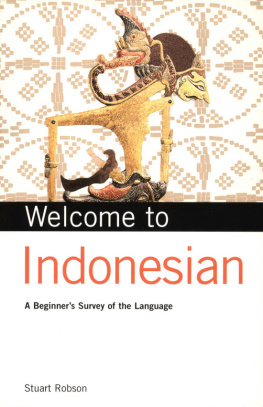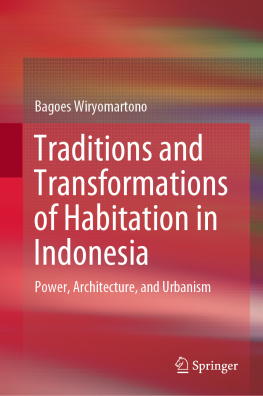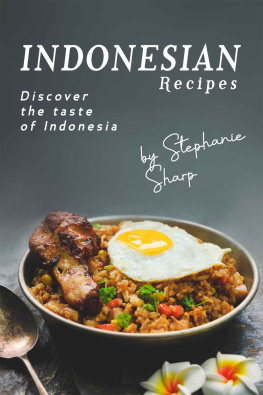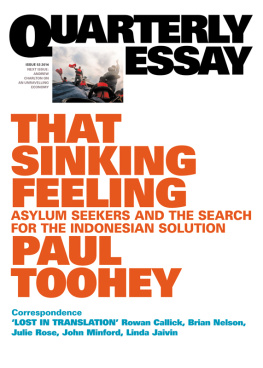Title: Knowing Indonesia: Intersections of Self, Discipline and Nation / Jemma Purdey, (editor).
Series: Monash Asia Series.
Notes: Includes index.
Subjects: AnthropologyIndonesia; Indonesia.
Contributors
Jemma Purdey is Adjunct Fellow in the School of Political and Social Inquiry and formerly ARC Post-doctoral Fellow in the Centre for Southeast Asian Studies, Monash University. She is author of Anti-Chinese Violence, 19961999 (Singapore: ASAA Southeast Asia Publications series with NUS Publishing, 2006). Her biography of Herb Feith was published in 2011: From Vienna to Yogyakarta: The Life of Herb Feith (Sydney: UNSW Press).
Lea Jellinek has worked for 35 years as a consultant anthropologist in Asia for agencies such as the World Bank, UN, AusAID, German Aid and Asian Development Bank, presenting the voice of the poor to decision-makers and evaluating how development programs have affected their lives. Her book The Wheel of Fortune: A History of a Poor Community in Jakarta (Sydey: Allen & Unwin, 1991) describes the life history of a low-income inner-city community in a rapidly changing Jakarta. Dr Jellinek helped initiate an NGO that focused on micro-credit and good governance, working with groups of poor women in five districts of Jakarta. Currently Lea is co-founder along with her partner Ed Kiefer of a village development program (Sukunan Bersemi) that aims to provide a model of sustainable living for other Indonesian communities to emulate.
Robert Elson is Professor of History at the University of Queensland. His main research interests include the modern and contemporary history of Southeast Asia, especially Indonesia; Indonesian political thinking, leadership in Indonesia; changing identity in Indonesia; the social and economic history of Southeast Asia; social and economic change in nineteenth and twentieth century Java; colonialism and its impact in Southeast Asia, especially in Indonesia; and the economic history of peasant production in Southeast Asia, 18001990. He is author of Suharto: A Political Biography (Cambridge: Cambridge University Press, 2001) and The Idea of Indonesia: A History (Cambridge: Cambridge University Press, 2008).
Edward Aspinall is a Professor in the Department of Political and Social Change, School of International, Political and Strategic Studies, College of Asia and the Pacific, ANU. He is the author of Opposing Suharto: Compromise, Resistance and Regime Change in Indonesia (Stanford University Press, 2005) and Islam and Nation: Separatist Rebellion in Aceh, Indonesia (Stanford University Press, 2009).
Bob Hadiwinata is Associate Professor, International Relations Department, University of Parahyangan, Bandung, Indonesia; an Alexander von-Humboldt Research Fellow on civil society and democracy; and a member of Aceh Study Group, East-West Center, Washington. He is the author of The Politics of NGOs in Indonesia: Developing Democracy and Managing a Movement (London: Routledge Curzon, 2003), and co-editor (with Christoph Schuck) of Democratization in Indonesia: Challenges of Consolidation (Baden-Baden: Nomos Verlag, 2006).
Heather Sutherland is Professor of Non-Western History at the Vrije Universiteit, Amsterdam. She is author of The Making of a Bureaucratic Elite: The Colonial Transformation of the Javanese Priyayi (Singapore: Heinemann Educational Books (Asia) for the Asian Studies Association of Australia, 1979).
Richard Tanter is Senior Research Associate, Nautilus Institute, and Professor in the School of Political and Social Studies at The University of Melbourne. His recent publications include Just in Case: Extended Nuclear Deterrence in the Defense of Australia, Pacific Focus, Vol. 26, No. 1 (April 2011); Masters of Terror: Indonesias Military and Violence in East Timor in 1999 (co-edited with Gerry Van Klinken and Desmond Ball), Lanham, MD: Rowman & Littlefield, 2006; About face: Japans remilitarisation, Austral Special Report 09-02S, 19 March 2009.
Introduction
Knowing Indonesia from Australia
Jemma Purdey
It is so terribly important that we should admit that we have a dickens of a lot to learn, not only about but from Asians (Feith, 10 September 1952).
This book explores the deeply complex and intersecting influences on the ways in which Indonesia has been studied and known in Australia from the 1950s until today. These influences fall under three linked themes: nation and policy, discipline and institution, and self and morality. As political scientist Simon Philpott writes, [k]nowledge arises from a complex interaction between individual authority, institutional authority and scholarly discourse (Philpott 2000: xvii).
Approaches to the study of Indonesia by scholars within the Australian academy come out of a variety of scholarly disciplines and theoretical perspectives, or what Clifford Geertz terms, branch[es] of knowledge of teaching (1995, 96). The study of Indonesia as a field emerged from area studies and comparative government within the American social sciences in the post-war years and was by its design a multidisciplinary endeavour. Geertz described his first engagement with the field of Indonesian studies, under the banner of a hybrid social science team of scholars in 1952, as an experiment trying to make sense of what other conceptions of knowledge, of knowing, and of the uses of knowledge could be brought into play (1995, 104). Scholarship related to the use of knowledge and the role of the intellectual by major twentieth century social science theorists, including Weber, Foucault and Said, inform this exploration of the interpretations and ways of knowing applied to the study of Indonesia. Practitioners have in the past made attempts to reflect on the nature of their knowledge of Indonesia. In particular, debate related to historiography in Indonesian studies has a long trajectory (Benda 1962; Smail 1961; Reid 1981), and a conversation about the role of values and its impact on the work of the Indonesianist is similarly not new. For example, Indonesianists such as John Legge and Benedict Anderson are among those who have had a long interest in the subject. In 1973, Anderson wrote, That academics are not simply specialists in particular fields of knowledge but also members of specific cultures and social orders, is something at once obvious and yet too frequently ignored, not least by academics themselves (Anderson 1982, 69).

